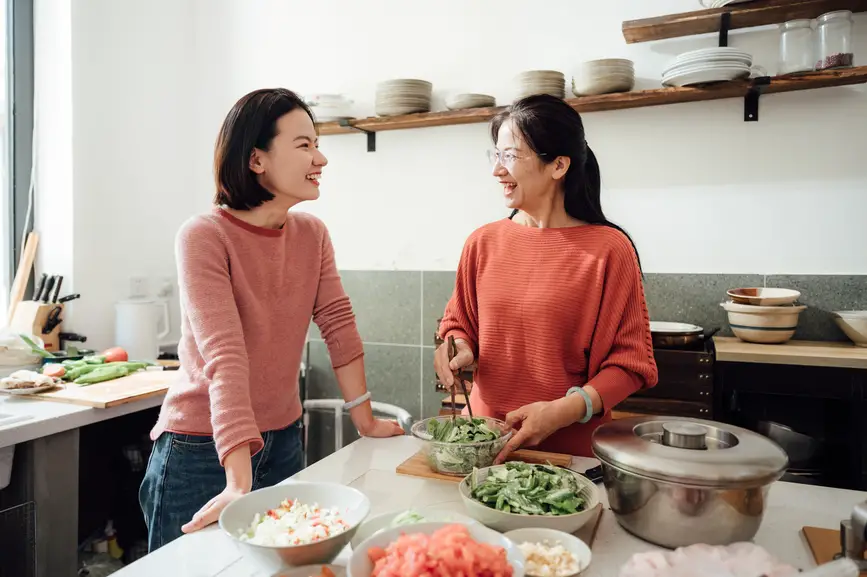Discovering the Joy of Cooking: A Journey of Healing and Self-Acceptance
By Lindsey Hall
The kitchen has always been a place of challenge and discomfort for me. From the moment I picked up a knife to chop an onion or pepper, I would hear comments like, “Wow, you’re slow at chopping. You want to learn an easier way?” It is a question that has been asked countless times by partners, friends, and even my parents. And each time, my answer has always been a resounding no.
You see, my relationship with cooking has been complicated, especially since my battle with an eating disorder that began when I was just 15 years old. In my mind, food became the enemy, and my only objective was to avoid it at all costs. So naturally, the idea of spending time in the kitchen cooking was out of the question. I believed that by abstaining from cooking, I would have more time to exercise and less time to be tempted by the smells and tastes of food. It was a strict rule dictated by my eating disorder.
Fast forward to today, after years of therapy and professional treatment, and I still feel like I’m playing catch-up in the kitchen. Growing up in a traditional home, I felt a sense of shame and inadequacy because I couldn’t quickly and efficiently prepare home-cooked meals. This belief, rooted in outdated notions of femininity, was something I had to unlearn.
The beginning of my journey towards healing came in 2013 when I embarked on my recovery from my eating disorder. Initially, I felt completely overwhelmed and lost in the kitchen. I realized just how little I knew about which foods complemented each other, what spices to use, and the various cooking techniques. I felt like I couldn’t speak the language of food, like a lost soul on a deserted island.
Recently, when my partner’s mother visited us in Colombia, she and I had to prepare dinner for eight people. As I stared at the assortment of ingredients, feeling a sense of panic and anxiety, his mother calmly swooped in and made it seem effortless. She grabbed various items and confidently declared, “Okay, we can make something out of this.” I was in awe. I had never made a meal without following precise instructions. I was not one of those people who could just throw together a dish without a recipe. The thought of making decisions about what to cook filled me with groans and stress.
But as I continued on my journey of recovery, I slowly learned to change my perspective on food and cooking. I realized that cooking is not about perfection; it is a trial-and-error process. As someone with a type-A personality, this was a hard pill to swallow. However, with practice and repetition, I became more comfortable with experimenting, adding, exchanging, and eyeballing ingredients. This newfound confidence in the kitchen helped silence the voice of my eating disorder, the one that used to count calories on autopilot.
Furthermore, I learned the importance of having a backup plan in case things didn’t go as expected. Music also became a major source of support for me. When I found myself getting too caught up in the details, worrying about the perfect chop or the exact measurements, I would turn on some music. It became a therapeutic distraction, allowing me to relax and enjoy the process. Some of my favorite artists for kitchen dancing include Muddy Waters, Sam Cooke, Frank Sinatra, and Ray Charles.
Another vital realization for me was that cooking is not meant to be a solitary activity but a communal one. It can be a space for bonding and joy. Dinner parties with friends, where we all contribute by cooking or bringing a dish, have become a favorite pastime of mine. From setting the table with plates and lighting candles to starting the music, I find excitement and pleasure in the experience. Cooking is no longer a chore but an opportunity to connect with others and find joy in the process.
Throughout this journey, I have constantly reminded myself of the marathon-not-sprint concept. I have embraced my struggles with cooking and owned them. I am not Gordon Ramsey, and that is perfectly okay. But breaking free from the clutches of my eating disorder has taken time. Over the years, I have slowly conquered my fear foods, stopped purging, and learned to find peace in not adhering to a rigid exercise routine. It has been a process of self-discovery and acceptance.
I wrote a blog post in 2019, sharing my experiences and tips on this journey. Looking back, I realize how much my perspective on cooking has shifted since then. I have healed in ways I never thought possible. The more I commit to my recovery, the more confident I become in my ability to live a life free from calorie counts and the fear of binge-eating. Although I may not always feel super confident in the kitchen, I know that at the end of the cooking process is a delicious meal shared with loved ones. And in those moments, my confidence and comfort continue to grow.
If you or someone you know is struggling with disordered eating, know that you don’t have to face it alone. Reach out to Project HEAL for a free assessment today at www.theprojectheal.org.

